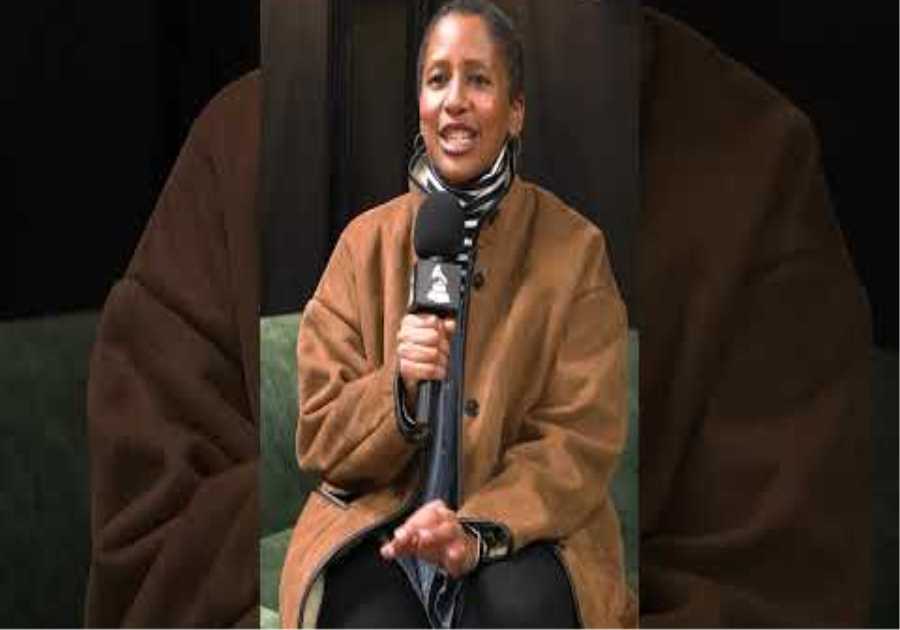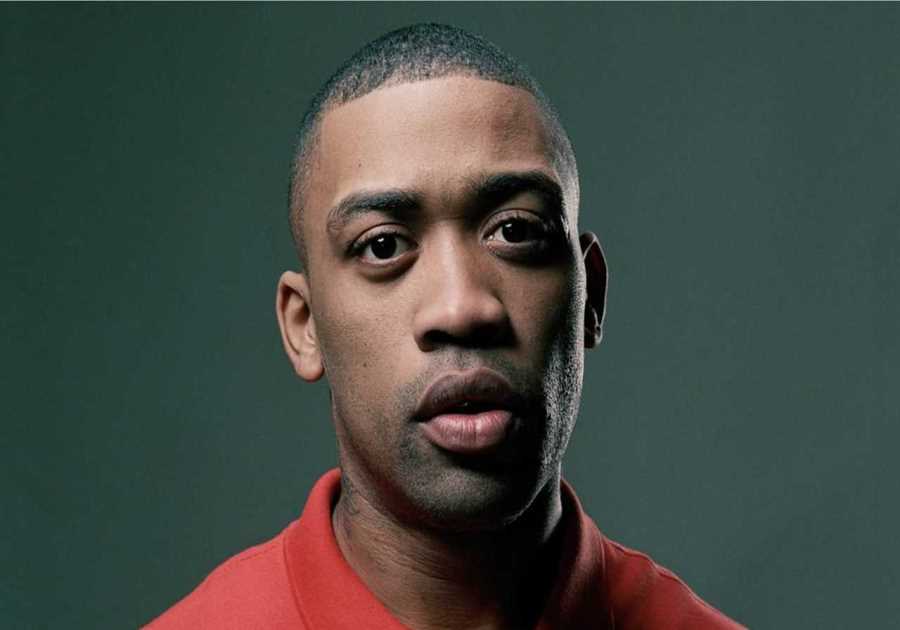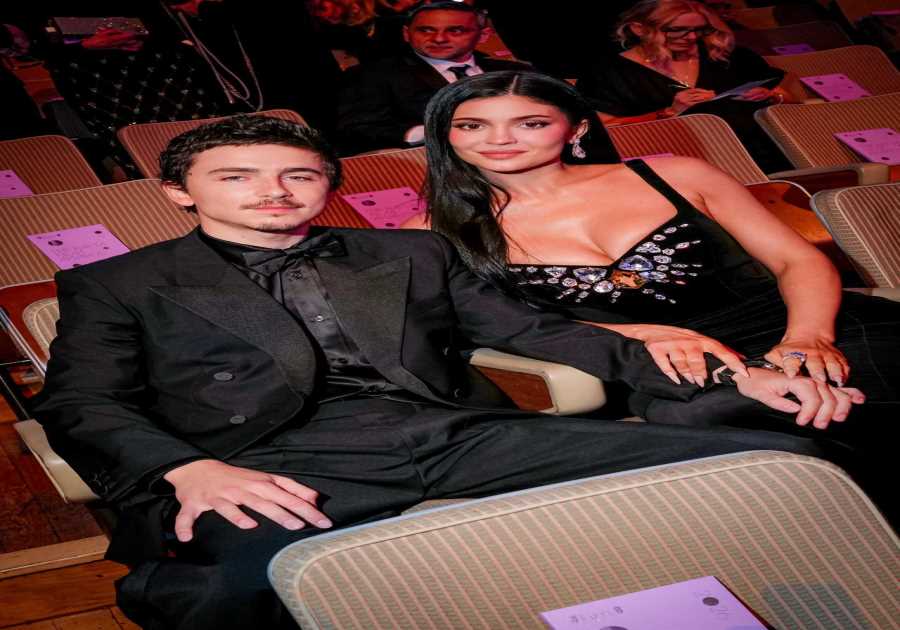WILLIAMSPORT, Pa. — Glove? Check. Hat? Check. Bat? Check. Cleats? Check. Passport? Time to check in.
When Alonzo and Sarah Griffin first learned that they were headed from Queensland, Australia, to Pennsylvania for the Little League World Series, they weren’t nervous. Their son Zaire, a player on the Brisbane North Baseball Little League team, was the reason their family was headed to one of their homelands, and they were going to make a major trip of it. But nothing about that part was simple.
With their star pitcher traveling with his team, they managed to make it to the States with their other son Avery, for an experience that they didn’t know could change their family unit forever. Win or lose, coming (back) to America, so to speak, was going to be an important endeavor.
In 2021, the LLWS had a different feel. The pandemic still had a hold of us in a way that was impossible to ignore, which greatly affected the tournament. Simply put, they closed the borders. Sixteen American teams played for the title and the rest of the globe simply had to watch.
This year, the 75th anniversary of the tournament, everything was back to full strength. Not only were the international teams back, but the field was expanded overall and the difference in town was palpable — 20 teams total, and a boatload of life memories for everyone involved. On a Saturday morning before breakfast time, a game between Brisbane and Bologna, Italy, was packed to the max at Volunteer Stadium in Lycoming County, Pennsylvania.
To say that the Aussies stood out is an understatement. Besides the obvious — the accents — there was gameplay and as important, the enthusiasm. When Australians show up in force to do anything, you notice. For the Griffin family, their history represents exactly how wanderlust can turn to more than that and ultimately a lesson in identity and understanding.
“Youth sports in general is very, very popular, pretty much predominantly with rugby league in Queensland, and soccer. Then I would say after that it’s AFL [Australian Rules Football] and maybe some of the other sports,” Alonzo Griffin, 41, explained at lunch on Sunday. “Basketball. Yeah. They don’t really play gridiron, which is football.”
Luckily, Griffin grew up playing baseball in San Diego.
Coming from a Black family living in a poor neighborhood, baseball is what Griffin tried to use as a distraction because home life was tough. His parents worked hard, but over time could barely keep their heads above water, living in hotels because, in America, being poor is extremely expensive. When it came time to move on after high school, he didn’t think a four-year school was for him. He tried out for his junior college team at Mesa College, but ultimately, without the family support, it wasn’t going to happen.
So he got a job. Working in retail marketing, next thing he knew, at 21, he had enough cash to do something that didn’t seem typically available to a kid of his background. Inspired by his friends who’d joined the military, he started traveling. As a reasonably large Black man with dreads, he didn’t exactly love the United States. Understandable.
The young man from San Diego who didn’t even take the SAT found himself in Europe of all places, making friends and having a blast. Germany, Switzerland, France, Finland, you name it. One of his military buddies who was in the Navy had told him tales of the Pacific, which led him to, you guessed it: Australia. Griffin, having made friends online, ended up there himself.
Then, one day, he went on a blind date, and he met the woman who would later become his wife. But the date wasn’t with her.

Otto Greule Jr./Getty Images
“I always tell them, they’re going to win more and they’re going to lose more games with their mind than they will with their arm or their bat, and that’s the biggest muscle you need to train.” — Travis Blackley
Down Under, the game of baseball starts later in life. T-ball begins at 7 or 8 years old, as opposed to, say, 4 or 5. Teams are made through clubs — not schools — all the way through high school. Everything is pay-to-play for the most part, and by the time you’re old enough to catch the eye of scouts, you’re playing what’s called state ball.
Travis Blackley knows the system well, because it took him all the way to the big leagues. A native of Melbourne, Australia, he used to be a competitive swimmer as a kid until he ran into Ian Thorpe – yes, the one who has five Olympic gold medals. So he switched to baseball, and admittedly was not a great player at all. He was discovered when pitching in a state tournament that his team didn’t even win. That got him to Australia’s U19 World Cup team, where everything changed.
“Looking back at me back then, I know I wasn’t the best. I can admit that,” Blackley, 39, pointed out Tuesday. “It was making that underrated state team, and having that brief couple months before the tournament, I finally got to work one-on-one with a real pitching coach. I basically went from no one had heard of my name … to being signed in like 10 months.”
You might remember him from one of his many stints in the bigs with five teams from 2004 to 2013. The definition of a crafty lefty with glorious tattoos to boot, his stuff was filthy. His funny claim to fame is that he struck out both Eric Young Sr. and Eric Young Jr. in his pro career.
Now, he’s a coach, and his experience is invaluable not just for the kids, but for families to see what it takes to make it to the next level. He’s a pitching coach for Zaire, privately.
“It’s the first year that we actually had him as one of the resources,” Griffin said. “This is something that’s really new to the region: specific instruction.”
It’s worth keeping in mind when you watch these children on the diamond. In this country, some kids basically come out of the womb with a bat and glove and are playing travel ball by the time they’re 7 years old. As the sport continues to grow in popularity globally, certain countries will catch up. But the difference in competitive level between Australia, Italy, and say, Japan or Canada, is obvious. And the effort is appreciated. Instinct on the diamond has a much higher learning curve.
“That’s what we were working on with these young boys, and so I also use a lot of analogies, and I try to explain, or get them to explain to me, how it feels, because I want them to know that I think there’s a lot to it,” Blackley said. “I always tell them, they’re going to win more and they’re going to lose more games with their mind than they will with their arm or their bat, and that’s the biggest muscle you need to train.”
Australia didn’t win a game this year in Williamsport, but their enthusiasm for the sport was infectious. The baseball community there is big, but relatively young compared with many nations. It’s something they take a lot of pride in.
“That’s the crazy thing, Australia has always been a very big sporting country. For the amount of people we have in the country, we bat way above our weight,” Blackley pointed out. “We got less people than California, yet we go to the Olympics, and we still finish seventh in the world.”
As for Zaire himself, Blackley knows talent when he sees it. As an undrafted free agent who was once the youngest Mariners pitcher to win a game until some guy named Felix Hernandez came along, Blackley knows what it takes.
As a coach, it’s rewarding.
“It feels amazing just to have an impact enough for someone to feel that way, and I can see it in Z’s face when he feels an adjustment working, you know what I mean? He’s very switched on. That kid knows,” Blackley said. “I already think he’s going to be a major league ballplayer one day. I’ve never seen a kid that good come out of Australia at that age, with that size, and that strength, and that drive.”
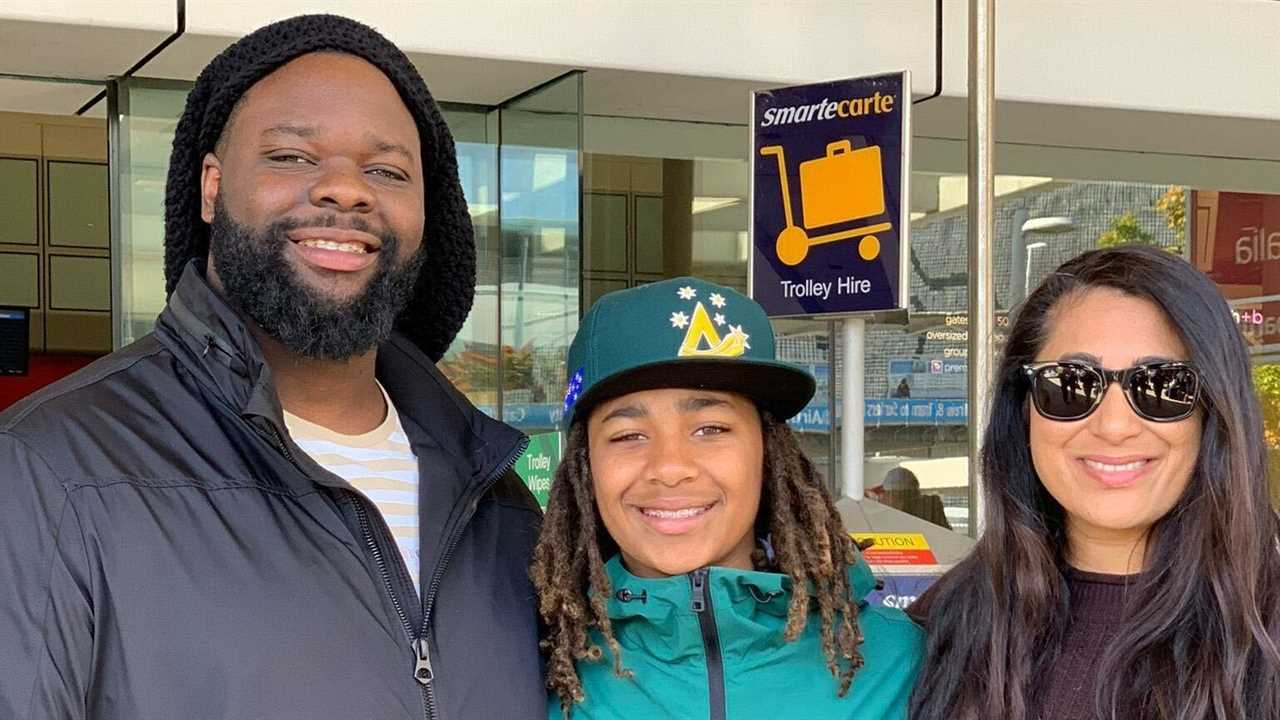
The griffin family
Sarah Griffin was not expecting to meet her future husband when she went out that night. She was out with friends when she walked by a guy who happened to be on a blind date. Such an impression was made that said guy left his own planned night out to try to get her number. At first, he summoned her over, which she declined. After he swallowed his pride and approached her in the club, she gave him her number. Then she left.
Before she could get down the block, she got a phone call. Still on his date, Griffin was calling to make sure the number wasn’t fake. The rest is history.
Growing up playing basketball, she didn’t exactly expect to be raising a baseball family, but is loving everything that comes with it, good and bad. The ritual of making sure Zaire gets all his work done for school and can still train privately and play with his team is something that they’ve all really focused on as a family.
“Baseball, it’s been incredible. I know Zaire trains seven days a week, he does the strength and conditioning, he does the pitching practice with Travis, plus all the team stuff on top of that, and the school. I think it’s been such a huge shift in mindset as well,” she said. “Just keeping that positivity and that enthusiasm to be able to think, OK, well, how to balance everything out, and how to organize your schoolwork, and then know that straight after school, it’s ready, game time, ready to focus. Ready to get this stuff in, just so you can better yourself and hit that next level and stage to be able to play on this platform.”
She moved to Australia from Sri Lanka with her family when she was 2 years old. Her father worked for the Hellenic Merchant Navy and her and her two sisters and one brother are a very tight family unit. As a schoolteacher, she’s used to tackling unusual situations and scenarios with aplomb.
Being a South Asian mother with Black children presents a special set of circumstances that the Griffin family has navigated as situations arise. Such as when Zaire was headed to a private school, and his hair became an issue. They fought back. This was just a few weeks ago.
“Before even coming here, we had a couple of meetings with the principal,” Sarah Griffin said. “We walked into the office to have this meeting, and the first thing he actually said was, ‘I’m just letting you know that we’ve sought legal advice on this issue.’ And we kind of took a step back and thought: ‘Why? Is it even really this serious?’ ”
The concern was that her son’s hair was down past his shoulder and touched his collar, an apparent violation of the dress code. For all the progress one might make on the field through sports, the old vestiges of colonialism can be ever-present in daily life.
“I said, ‘Well, hang on a second. This is a Christian school. God said, come as you are,’ ” Sarah Griffin said. “And he said, ‘Well, what’s going to happen is if we let everyone actually do whatever they wanted or wear their hair however they wanted, we’d see chaos in this school.’ ”
The principal fell back on the famous code word “policy.” He was talking to an educator (Sarah Griffin) and a social worker (Griffin), that didn’t fly with the Griffin family. So, Griffin asked a simple question about said policy.
“Was it centered around education? Was it centered around safety?” Griffin said. “So his response was it was centered around conformity. And this is something that you actually just have to do because this is the way we want our students to look. I said, ‘Well, I’m pretty sure the person that actually made this policy didn’t look like my son.’ ”
Cutting his hair was never going to be an option for the kid, who did it specifically to bond with his father and younger brother, who both have dreadlocks.
“Identity is huge for young people. You know what I mean? And for them to identify with their culture and to actually have someone saying, ‘Hey, well, I don’t believe that’s appropriate for him to identify with your culture.’ Not saying that directly, but somewhat summing that up,” Griffin explained. “We took that kind of rough because we couldn’t actually understand why. Zaire is not a behavioral kid. He’s the nicest kid that you can ever meet.”
Then, Sarah Griffin played a card they weren’t expecting. The baseball card.
“I actually questioned him and I said, ‘you’re actually concerned about my son’s hair, but yet you’re not even looking at the achievements that he’s achieved, where he’s actually going to the Little League World Series. Why have you not even acknowledged that, or even mentioned that?’ ” she said. “The next day, I get an email from the head of department saying, ‘Oh, Sarah, we’d like to know if you’ve got any pictures or if you can give me some information.’ And I thought, ‘OK. Well, you know what? If I hadn’t even mentioned anything, you wouldn’t have even brought it up.’ So it was all a bit disappointing, to be honest, because they are a great school, but we didn’t expect anything like this to come out of it. And we saw it for what it was, like, OK. If we don’t conform, then basically you’re just going to get dismissed.”
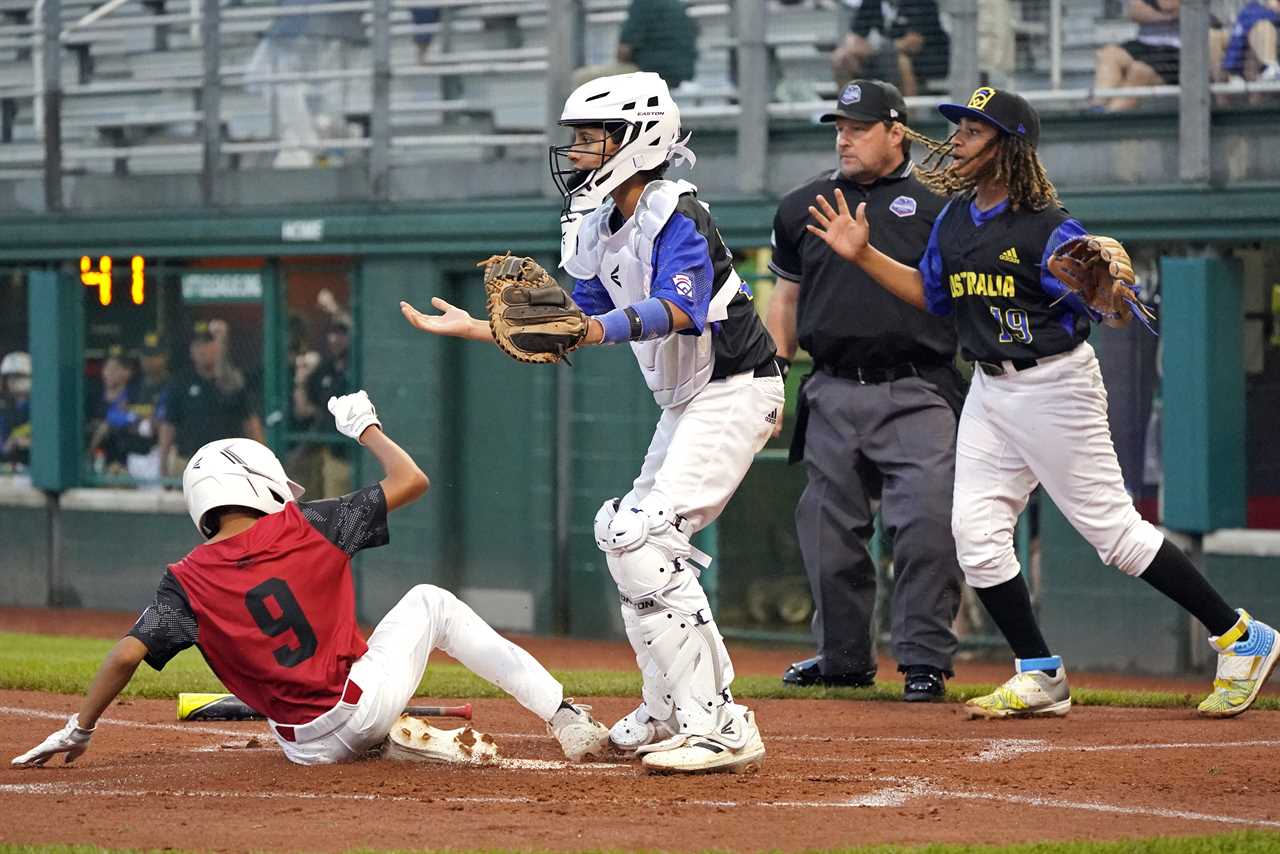
Gene J. Puskar/AP Photo
With an apparent uneasy truce reached with the school, Sarah Griffin knows full well the task at hand, even if they aren’t enduring the rigors and danger of American life – something the family is contemplating in coming years. The boys really like the States, and it’s not entirely foreign to them, even if their dad, a California native, slips into a bit of an Aussie accent these days.
“I think identity is such a huge thing, especially coming to Australia and growing up with a lot of Caucasian kids around me as well,” she said. “Having that strong Black community behind you, and making sure that you are being taught exactly what you need to know, and just having parents that actually say, ‘You know what? Don’t worry about it. You stand up for what you need to stand up for.’ I think you’ve got to have that really strong support system, no matter what, just to be able to tackle things. And this is what we try to incorporate with Zaire and Avery, you know?”
The idea of coming back to America as a family is a daunting one for her.
“If it’s going to benefit the kids then, yeah, definitely I would move over here. But then in terms of that, you’ve got to also look at the negative aspects,” she said. “The gun laws. Down in Australia, we don’t have to worry about safety and guns and walking down the street at 3 in the morning and the kids, something happening. Kids getting shot or drive-bys or whatever happens. And that is one of the barriers that we face where we have to think of all those different things.”
As for this trip, they just took a couple weeks to themselves. They couldn’t connect with as much family as they wanted in California but are heading to New York City after Williamsport and maybe one more stop before they go back home.
As for Zaire, when asked about his hair, he kept it real. Standing with his other teammates during a TV interview, one of whom rocks what he calls a horse tail and another whose dad shaped his hair into a mohawk since he knew he’d be on the big stage, the kid who struck out 26 of 28 batters in regionals while topping 70 mph stayed true to his roots.
“I’ve been growing it for two years. The story behind it is that my dad and my brother got it, so I said why not,” Zaire explained to ESPN’s Sebastian Salazar. “It’s a part of my culture, too. African American.”
Be it baseball, be it hair, be it Australia or stateside — the goal is the same: Keep growing.
-----------------------
By: Clinton Yates
Title: Little League pitcher’s family nurtures son’s baseball career and Black identity Zaire Griffin stands out on the Australian team, while navigating life in Australia off the field
Sourced From: andscape.com/features/little-league-pitchers-family-nurtures-sons-baseball-career-and-black-identity/
Published Date: Thu, 25 Aug 2022 16:52:18 +0000
Did you miss our previous article...
https://ballerawards.news/sports/jury-awards-vanessa-bryant-16-million-for-photos-taken-of-crash-that-killed-kobe-and-gianna-bryant

